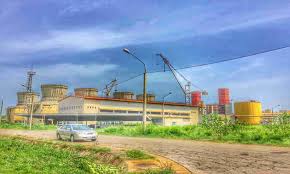Whereas the euphoria of the unveiling of Kajola Wagon Assembly Plant established by the Chinese Civil Engineering Construction Corporation (CCECC) over the weekend in Ogun is still in the air, development analysts have picked holes in the addresses presented by both the Vice President Yemi Osinbajo and Minister of Transportation, Rotimi Amaechi.
Analysts queried why upon Nigeria is blessed with world class iron ore, there was no mention that the iron ore to be used in the plant shall form major part of the local content, rather the minds of the officials went straight to job creation.
Fact checks showed that the major raw material needed for Rail Wagon rolling stock plant remains iron ore.
Experts say if the new plant will rely on imported iron from China, it means that CCECC have shortchanged Nigeria as this plant clearly presents one of the best opportunities to revive the nation’s moribund iron and steel sector of the economy.
Whereas many Nigerians had expected to hear that the plant will help in quickening the revival of Ajaokuta Iron and Steel Complex, Vice President Yemi Osinbajo said establishing a rolling stock plant in Nigeria will help transform commerce across Africa. He added that the plant is central to the production of rolling stock needed for the railway modernisation programme of President Muhammadu Buhari.
“The railway is not only an alternative and comfortable mode of transportation; it holds the master key to transforming commerce in Nigeria and across the continent.
“By linking our ports to rail lines and now, building the rolling stock locally, import and export business within, into and out of Africa’s largest market will never be the same.“When completed, it is expected that the plant would produce some parts of the wagons for the Lagos – Ibadan and Abuja – Kaduna rail lines, but also for the central rail lines and to satisfy the needs of other rail operators within the West- African sub-region.
“Secondly, the citing of the plant here in Nigeria and the commitment to hiring Nigerians and Nigerian businesses affirms the president’s directives in Executive Order 5 on prioritising Nigerians and Nigerian businesses in the innovation, production and procurement of engineering projects and services,” he said.

Osinbajo said the plant would offer an important platform for engineers, technicians, artisans and other professionals to gain specialised skills required for the production and maintenance of rolling stock.
He added that it would invariably conduce to spin-off businesses in the region of operation and across the country wherever rail networks are in existence.
“After completing the Abuja – Kaduna railway project in July 2016, this administration commenced construction works on the Lagos – Ibadan railway modernisation project in March 2017.“Following which, we initiated the rehabilitation and completion of the abandoned Itakpe – Ajaokuta – Warri rail line which was started over three decades ago.
“Also, we are optimising the Lagos-Ibadan Rail modernisation project by extending it to the Apapa Port, the nation’s busiest port for the efficient movement of cargo from the port to various destinations.“This will expedite import/export flows, decongest the ports, and depressurise our roads in the process,” Osinbajo said.
Earlier, the Minister of Transportation, Mr Rotimi Amaechi, who was equally mute on use of Nigerian iron and steel products in the plant, said the Federal Government, in order to address the increasing demand on the new Nigeria Standard Gauge Railway Service, awarded a contract for the procurement of Rolling Stock.“It will also serve any railway service in the West-African sub-region.
“The Ministry of Transportation realising the need of the advantage to set up this type of plant considering the potential need in view of the on-going rail projects in the country and the sub-region encourage CCECC to establish this plant.
“It is expected that the plant would generate job opportunities for Nigerians and as well facilitate the much-desired objective of the government towards the local content capacity development.“This project is, therefore, a direct investment of CCECC Nigeria Ltd in the country and would remain as part of the gains from the contract signed for the supply of rolling stock.
“This will be the first of its kind in Nigeria and the first batch of the wagons to be assembled from the production line of this plant will form part of the rolling stock for Lagos – Ibadan and Abuja – Kaduna Railway operations.
“Subsequently, other rolling stock would be produced as its production capacities increase.
“More so, we would be able to conserve our much needed foreign exchange which can be deployed to other areas of development.
“It is cardinal to mention that the sustainability of our railway modernisation projects would depend on our ability to develop local capacity to construct, maintain and manage our new railway system,” Amaechi said.

In his goodwill message, the Managing Director, CCECC, Mr Michael Jiang, said the company was committed to making Nigeria self-sustaining in the technology of rolling stocks, but still maintained silence on the sources of their core raw material which is iron and steel.









